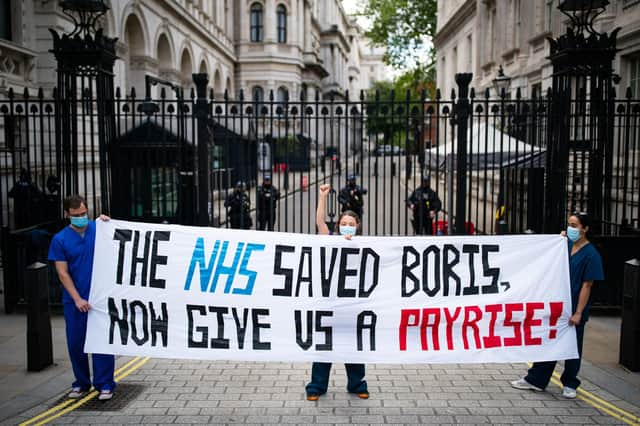NHS staff were treated better during coronavirus pandemic. That needs to become the norm – Dr Chris Sheridan


August is a very important date in the NHS diary across Scotland: not only does it signal a change of rotation, year, and in some cases specialty for most junior doctors, it also means an influx of newly qualified doctors, fresh out of medical school.
Next month, however, things will be slightly different. Many final-year medical students joined the workforce early to help fight Covid-19 and were likely given a baptism of fire, so the thought of joining the medical profession“officially” in just over a week’s time probably doesn’t seem that daunting any more. After all, they’ve started their career in the midst of the worst pandemic the NHS has ever seen.
Advertisement
Hide AdAdvertisement
Hide AdI’m very proud and not at all surprised to see the response of my newly minted colleagues in joining the effort when they weren’t obliged to – they have the qualities, willingness, and now the training to do so. For them, it’s meant not getting the usual rest following gruelling final exams before starting even more gruelling work as junior doctors. And due to Covid-19, they’ve sadly even missed the usual chance to attend their graduation ceremonies and celebrate with proud friends and family.
But just because the changeover this year is slightly different, that doesn’t mean the same stresses won’t exist: which is why it’s vitally important to ensure that personal well-being for doctors is maintained.
We’ve spoken a lot about how the NHS rose to the challenge of Covid-19 – which is obviously true of the staff, but it’s fair to say that the NHS as an employer also stepped up. It might have taken a pandemic to do it, but in many more locations than before, NHS staff now have comfortable rest areas, relaxation sessions, warm food and free car parking. These may seem like little things – and they’re hardly the height of luxury – but in terms of staff well-being, they’re essential. And not just in the middle of a global health crisis: they’re essential all the time.
For someone who has been on their feet for hours, rushing from patient to patient, having a designated place where you can go and sit down, even just for 15 minutes, to have a hot drink and gather your thoughts is massively beneficial for your well-being, as well as for the patients you look after. Patient care and well-being is a top priority for doctors – those patients deserve a doctor who is rested and ready to treat them, even if their illness isn’t making newspaper headlines.
For junior doctors who are just starting out in the profession, being able to park your car at work for free is a pretty big deal. First-year juniors don’t earn huge sums, and for many the only way to get to work is to drive, particularly if they’re on nightshift – so thinking about how much they potentially need to pay out in parking charges can be quite stressful, particularly with large student debts accrued in their medical training looming in the background. This is especially true in their early career where they rotate from hospital to hospital as often as every few months, frequently to previously unfamiliar locations to them.
That’s why, as the initial emergency response to Covid-19 calms down, the NHS must not forget that for doctors and other NHS staff, this pandemic – and the work to recover from it – is not over. Nor will it be for years to come.
So, I hope this changeover next month not only signals the start of a new rotation for junior doctors, but it signals real change in supporting well-being within our workplaces too – permanently.
Chris Sheridan is co-chair of the BMA’s Scottish Junior Doctor Committee
A message from the Editor:
Advertisement
Hide AdAdvertisement
Hide AdThank you for reading this article on our website. While I have your attention, I also have an important request to make of you.
With the coronavirus lockdown having a major impact on many of our advertisers - and consequently the revenue we receive - we are more reliant than ever on you taking out a digital subscription.
Subscribe to scotsman.com and enjoy unlimited access to Scottish news and information online and on our app. With a digital subscription, you can read more than 5 articles, see fewer ads, enjoy faster load times, and get access to exclusive newsletters and content. Visit www.scotsman.com/subscriptions now to sign up.
Our journalism costs money and we rely on advertising, print and digital revenues to help to support them. By supporting us, we are able to support you in providing trusted, fact-checked content for this website.
Joy Yates
Editorial Director
Comments
Want to join the conversation? Please or to comment on this article.